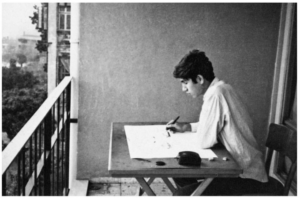
“Book publishing in Nigeria is a foolish undertaking; a publisher is a sort of fool,” says Richard Ali, co-founder of Parrésia Publishers, one of Nigeria’s prominent indie presses. He made this statement in response to a Sun interview question on the challenges of publishing in Nigeria. But then he adds, “we do it because we believe in it.”
This statement speaks to the challenges of publishing on the continent as much as it gestures towards the inspiring work being done by brave entrepreneurs to tackle these challenges. It also gets at the heart of the story behind the establishment of Parrésia Publishers. In 2010, Nigerian writers were becoming bold in literary experimentation, but there was a lack of publishing industries to meet such growth. The following year, Richard Ali and Azafi Omoluabi-Ogosi came up with the idea to set up a literary agency. But this earlier initiative eventually morphed into publishing company.
Omoluabi – Ogosi is currently the Chief Executive Officer, and Richard Ali is Chief Operating Officer. Before launching Parrésia, they had acquired extensive experience in publishing. Omoluabi – Ogosi was the Editor for Kachifo Limited, publishers of the Farafina Magazine, and Ali was a former Editor of the Kaduna-based Sardauna Magazine. Together, they’ve gone from selling 1,000 copies of published books in a year or more to selling them in a few months after release.
In response to Brittle Paper’s inquiry about what inspired the project, Ali and Azafi Omoluabi-Ogosi responds:
We started out with the aim of giving a voice to writers who have never been heard on the Nigerian publishing scene. To fulfill the mission, we gave the writers nothing but our trust for their words. We told them we would keep their words as they birthed their stories, we would watch as their stories took flight, like a butterfly seeking freedom with every part of it wings.
Parrésia Publishers is based in Okota, Lagos, Nigeria, and publishes fiction and creative non-fiction works under four imprints: Regium Books, Origami Books, Cordite, and Ọmọde Mẹta. Their author roster includes familiar names like Molara Wood, Chika Unigwe, Chigozie Obioma, Obinna Udenwe, Onyeka Nwelue, Abubakar Adam Ibrahim, Emmanuel Iduma, and a host of others. Currently, Parrésia Publishers is home to award-winning titles like Cheluchi Onyemelukwe-Onuobia’s The Son of the House awarded Best International Fiction Book Award and Helon Habila’s Oil on Water shortlisted for the Orion Environmental Book Award and Pen/Opera Book Award in 2012.
Each of the four imprints responds to a specific demand in the publishing market and shows the extent of Parrésia’s impact in contemporary Nigerian literature. Regium is a traditional publishing imprint with an annual catalogue of five fiction books. To encompass the diversity of Nigerian writing today, the imprint includes literary fiction, exceptional popular fiction, and short story collections that demonstrate exceeding craft and innovation. The Regium imprint is selective and offers advances on royalties for first-time authors. Origami Books is a self-publishing platform that caters to the specific needs of self-funded writers, especially those who want to be in full control of the book production process. Cordite is a new, traditional-style publishing company for genre fiction based in Lagos, Nigeria, and is jointly owned by Parrésia Publishers and Helon Habila, Nigerian author and professor of Creative Writing at George Mason University in the United States. The last few years has seen a call for more children’s books publishing on the continent. Parrésia Publishers launched Ọmọde Mẹta to address this need. So far, they have published ten-year-old authors Braibi Amitan Mbok, sixteen-year-old Hussein Salim Hussaini, Richard Ali, and Abubakar Sidi.
Parrésia has contributed, in no small way, to revitalizing the Nigerian literary landscape. They have created synergies between the cultural capital of Diaspora writers and the needs of local authors. Their suite of publishing and publicity offerings give early career writers the confidence they need to get their voices heard. Parrésia’s rich catalogue of books and impressive roster of writers, containing both established and new voices, have taken almost 10 years to build. No small feat.
But as Ali and Omoluabi-Ogosi see it, “every step of the way, every milestone and every stumble makes it all worthwhile as we keep keeping the words that matter in trust.”









How the Traditional Publishing Industry in Africa Is Shaping the Emergence of New Voices in African Literature - Afrocritik September 08, 2022 07:11
[…] as a debut author won the prestigious Windham-Campbell Prize earlier this year. In a Brittle Paper interview, Omoluabi-Ogosi and Ali stated that they were mainly interested in “giving a voice to writers […]